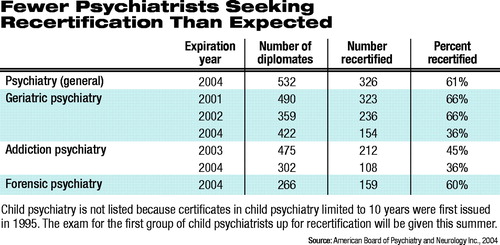Time for Recertification? APA Helps You Prepare
Do you need to recertify? You do—every 10 years—if you are a general psychiatrist originally board certified in 1994 or later and you want to maintain your board certification.
This year the second class of general psychiatrists to receive their original board certification after the 1994 cutoff will be required to take a closed-book, proctored exam on a computer administered by the American Board of Psychiatry and Neurology (ABPN) to maintain certification.
The ABPN does not require general psychiatrists certified prior to 1994 to take the exam to maintain their certification.
There are no lifetime certificates for geriatric, forensic, and addiction psychiatry. Time-limited certifications in geriatric psychiatry began in 1991, with the first expirations occurring in 2001; in addiction psychiatry they began in 1993, with the first expirations occurring in 2003.
Deborah Hales, M.D., APA's director of Education and Career Development, said the move to require recertification is part of an effort across American medicine to demonstrate the quality and competence of the nation's physicians to policymakers, regulatory agencies, and the public.
“Failing to recertify in the modern era is likely to be professional suicide,” Hales warned. “The entire house of medicine is requiring this as a way to gain back public trust.”
She said that even psychiatrists who were certified prior to 1994 are not immune from the movement toward “maintenance of certification” since many state boards of medicine may require physicians who do not recertify in their specialty to take a state medical board exam to maintain their licensure.
“This is coming,” Hales said. And, she noted, APA is committed to helping psychiatrists prepare for and pass the exam.
In addition to its world-renowned annual meeting, the Association is offering a variety of tools—many of them easily accessible through APA's Web site—to help prepare for recertification. These include “Grand Rounds Online,” Focus: A Journal of Lifelong Learning in Psychiatry, and APA's practice guidelines.
The 11 practice guidelines published to date represent state-of-the-art understanding about the optimal ways to treat patients with a variety of conditions commonly seen by psychiatrists. Members can access the guidelines online free and earn 3 to 5 CME credits by taking the multiplechoice test that accompanies each. There are also references for additional information on each of the guideline topics.
Members already familiar with Focus know it to be a clinical review journal that appears quarterly, with an annual self-assessment examination on the material, also appearing online, at the end of the year. One of the best tools for staying current in psychiatry and preparing for recertification, Focus offers up to 40 CME credits a year.
Both the Focus self-assessment exam and the practice guideline CME tests have been approved by the ABPN as part of a “comprehensive lifelong learning and self-assessment program,” one of the components of the concept of maintenance of certification being mandated by the American Board of Medical Specialties.
“Grand Rounds Online” offers another interactive, Web-based vehicle for staying current in psychiatry. Recent courses offered to members via the “Grand Rounds Online” list serve include “From Science to Practice: How to Critically Evaluate the Literature,”“ Homophobia,” and “Interactions of Physicians and Pharmaceutical Companies.” Each program provides free CME for the live or archived discussion.
The deadline for this year's recertification exam for general psychiatry has already passed. The deadline for applications for next year's exam—to be held July 31 to August 4, 2006, and August 7 to 11, 2006—is October 1. “APA wants to help our members practice the best medicine possible,” said Hales. “And we want to help them pass these exams.”
APA's CME programs can be accessed online at<www.psych.org/cme/apacme>. Information on the recertification exam and schedules is posted online at<www.abpn.com/recertification/content—psych-recert.html>. Information on maintenance of certification is posted online at<www.abms.org/MOC.asp>.▪




